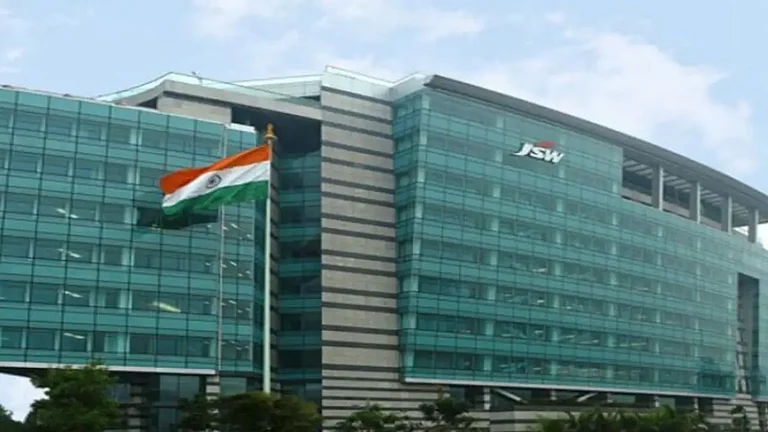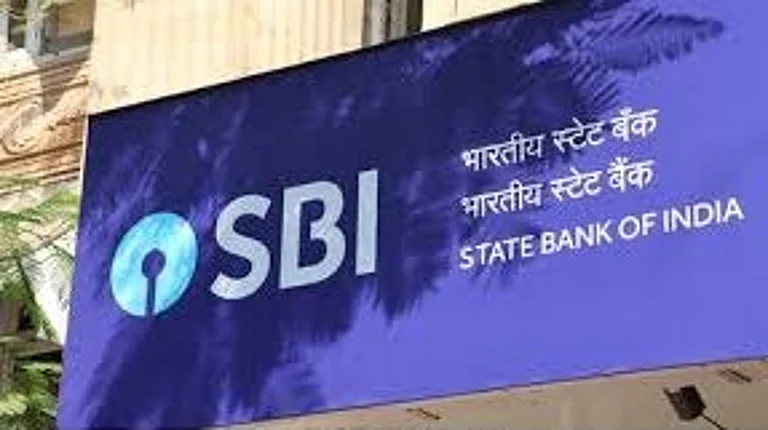The Supreme Court’s liquidation order for Bhushan Power and Steel has put JSW Steel’s investment plans in the company at risk, triggering a sustained decline in its stock. Many brokerages turned bearish after the apex court on May 2, ordered the liquidation of BPSL over five years after the JSW Steel received approval to acquire the bankrupt company in an insolvency auction.
JSW Steel Sinks 7% in Two Days after SC Exposes Legal Cracks in BPSL Acquisition: Here’s What Its All About
The Supreme Court's liquidation order for Bhushan Power and Steel has triggered a sharp stock decline and raised serious questions about the effectiveness of India’s insolvency framework
JSW Steel shares are in a free fall, tumbling for four consecutive sessions and shedding over 7% in the last two alone.
CLSA has an ‘underperform’ call on the stock with a target price of Rs 825. Although JSW Steel brokerage is eligible to get back the initial investment but recovering the same could be a long, drawn-out process, the brokerage said, adding that it expects a 5-9% impact on the stock’s valuation from its closing price on April 30. On the other hand, Nuvama too has a ‘reduce’ rating on the stock.
Bhushan Steel contributed approximately Rs 700bn to JSW Steel’s enterprise value and now even if JSW Steel recovers its base investment, the incremental value creation of nearly Rs 420bn is now likely lost, InCred Equities said in a report. “We expect consensus EBITDA estimates to be cut by 30% in FY26F and FY27F,” the brokerage added.
Apart from the impact of this judgment on the stock, it has also opened a Pandora’s Box of troubles for the Insolvency and Bankruptcy Code. This big case has actually tested the nascent insolvency law. “After going through the rigors of the National Company Law Tribunal (NCLT), National Company Law Appellate Tribunal (NCLAT) and Supreme Court, an acquisition is made null and void,” media reports quoted Binoy Parikh, partner at Katalyst Advisors said. “It’s a setback to the purpose of IBC, which is securing the interest of creditors.”
What was the May 2 Order?
The Supreme Court of India delivered a knockout blow to JSW Steel's years-long attempt to acquire Bhushan Power and Steel, rejecting the acquisition and ordering the company's liquidation. In a scathing judgment, the Court condemned the deal as an "ill-motivated plan" plagued by procedural violations and strategic delays that appeared to align conveniently with favorable shifts in the steel market.
The apex court highlighted procedural and legal lapses in one of the most high-profile takeovers under the Insolvency and Bankruptcy Code, raising questions around missed timelines, inconsistent creditor oversight, and related party structures in resolution plans that were allowed to proceed despite non-compliance on several fronts.
The Committee of Creditors has failed to protect the interest of the creditors by supporting JSW to implement “its ill-motivated plan against the interest of the creditors”, the apex court said in its order.
The Curious Case of Dirty Dozen Members: Bhushan Power and Steel
The corporate debtor was among the 12 big accounts highlighted, for corporate insolvency resolution process under the Insolvency and Bankruptcy Code, by the Reserve Bank of India back in June 2017. These 12 debtors were infamously known as the ‘dirty dozen’, and Bhushan Power and Steel accounted for about 25% of the total non-performing assets in the country.
The resolution professional identified nearly Rs 47,826 crore of claims in respect of both financial creditors and in case of operational creditors. Large-scale firms such as JSW, Tata Steel and Liberty House submitted their respective resolution plans, but it was JSW which received the Committee of Creditors’ approval for the acquisition.
What Misses the Eye
An ED investigation on Bhushan Power’s former promoters, who allegedly diverted Rs 4,025 crore in bank loans, compounded troubles for JSW. ED provisionally attached the assets of Bhushan Power under the Prevention of Money Laundering Act, which was later stayed by the NCLT following an appeal by JSW.
During the investigation under the Prevention of Money Laundering Act, it was found that JSW, Bhushan Power and Jai Balaji inked a tripartite joint venture agreement in 2008 for joint allocation of Rohne Coking Coal block.
These facts were suppressed by JSW in its resolution plan and based on this, an issue was raised before the NCLAT arguing that JSW was a ‘related party’ and therefore, ineligible under Section 29A. As per Section 29A, those person(s) are not eligible to submit a resolution plan, particularly those with ties to the corporate debtor's previous management or financial issues. The section lists various clauses clearly defining the criteria that could deem any entity ineligible for submitting the resolution plan. A resolution applicant is also required to submit an affidavit stating that he is eligible under Section 29A along with the resolution plan.
However, the NCLAT has virtually justified the suppression of facts, the court order said. “Since, the issue of ‘Related Party’ was not pressed into service by the learned advocates appearing for the appellants, during the course of hearing of these appeals, we are not stretching the issue of ‘related party’ any further.”
There was nothing on record to show whether such affidavit, which is filed to state one’s eligibility under Section 29A, was verified by the resolution professional, the Supreme Court said.
What ‘s the Fuss All About?
The case is related to various appeals filed in response to the judgments passed by the NCLAT in relation to the insolvency and bankruptcy proceedings against Bhushan Power and Steel. The appellate tribunal on February 17, 2020 approved the resolution plan of JSW Steel and dismissed the appeals filed by operational creditors of the company.
In this particular case, it was argued that the company has not complied with the rules and has envisaged to priorities financial creditors’ dues before operational ones. Some of the operational creditors of Bhushan Power have argued that JSW has made payment to the operational creditors after a period of total default of 900 days. They have also argued against JSW for including the EBITDA of Bhushan Power in its financials despite neither making any contribution to its operations nor rolling out full payments to the creditors.
On the other hand, JSW’s side has argued that the resolution process has resulted in a payment of Rs 19,350 crores to financial creditors, along with payments to operational creditors of 50% recovery of their admitted claims by March, 2022. JSW had brought in the entire Rs 8,550 crore equity commitment in two tranches—Rs 100 crore of equity shares and Rs 8,450 crore of compulsorily convertible debentures, the JSW-side argued. They also claimed that some members of the CoC have approved to extend the effective date.
The company failed to infuse the committed Rs 8,550 crore in equity and instead filed an appeal before the National Company Law Appellate Tribunal and this delay coincided with a rise in steel prices, suggesting commercial advantage may have influenced the stalling, the apex court said.
The Supreme Court View
The Supreme Court said, “…it appears that in the instant set of Appeals, the respondents-JSW, CoC and Resolution Professional have sought to sweep many seminal issues under the carpet to cover up gross violations of the provisions.” The court also highlighted that there is no record to show that the NCLT or NCLAT in any of their orders have extended the effective date and thus, it was observed that it cannot be vindicated by the court.
The apex court also questioned the delay in the submission of the resolution plan to the NCLT, which took almost one and half year instead of the stipulated 270 days. One of the main objectives for enacting the IBC is to complete the entire proceedings in a time bound manner, the court said, adding, “…the NCLT had committed grave error of law in approving the said resolution plan”.
JSW’s resolution plan is in complete contravention of the mandated regulations as apart from all the aforementioned discrepancies, the plan did not even comply with other important regulations that give priority to the dues of operational creditors over that of financial creditors.
“The conduct of JSW demonstrated ill-intent and malafides to mislead the Court and misuse the process of Court in order to delay and defer the implementation of the Resolution Plan which was in fact an unconditional plan,” the order said. The company had presented a ‘rosy picture’ of resolution plan at the time of evaluation process and has failed to comply with the rules; instead it filed the company appeal before the NCLAT, just to delay the implementation of the plan, the central court’s statement said.
Cooks That Spoiled The Broth
In addition to JSW, the court also questioned other parties, including the resolution professional, Committee of Creditors, and NCLAT. While the resolution professional was reprimanded for failing to discharge the statutory duties, for the CoC the court said the committee failed to exercise its commercial wisdom while approving the resolution plan of the JSW.
The apex court also questioned the authority of the NCLAT of doing a judicial review and staying the provisional attachment order of the ED and said the order was coram non judice. “Neither the NCLT nor the NCLAT is vested with the powers of judicial review over the decision taken by the Government or Statutory Authority in relation to a matter which is in the realm of Public Law.”
Way Ahead for JSW Steel…
As the order is given by the apex court in India, the entities involved can opt for reviewing rather than an appeal. While the steel producer does have a chance to follow a review, the scope of it is very narrow as the Supreme Court had ruled after considering the facts, Piyush Agarwal, partner at AQUILAW said.
There are only limited grounds for reviews, such as an error apparent on the face of the record. This could be if the court has not considered document or the parties involved were not able to produce any document due to some issues (like bonafide-related issues) or if the parties want a clarification on the order, which might not be a case here, he added. However, they still have an option to file for review.
“Once we receive the Order and are able to review the same along with our legal advisors, we will decide on our further course of action. We shall keep the Exchanges informed of further developments as required under applicable,” JSW Steel said in an exchange filing on May 2.





